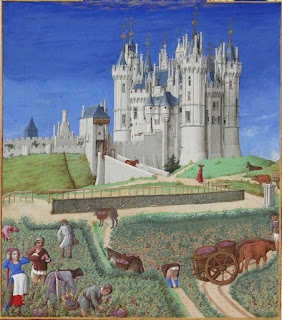 |
| Castle of the Duc de Berry by the Limbourg Bros (15th c.) |
“Agricola … described his campaign … as ‘keeping a conquered people under control’ … His intention was … [that the native Britons] become accustomed to peace and quiet by the provisions of amenities. Hence he gave … assistance to communities to build temples, market-places, and town houses. He praised those that responded promptly [to Romanisation] and censured the dilatory. As a result they began to compete with one another for his approval, instead of having to be compelled … even our style of dress came into favour and the toga was everywhere to be seen. Gradually, too, they went astray into the allurements of evil ways, colonnades and warm baths and elegant banquets. The Britons … called it ‘civilisation’, although it was a part of their enslavement [Tacitus, Agricola and Germany, Oxford World’s Classics, Ch 18-21].”
Could it be that we are at risk of succumbing to the illusion of good living while in fact being profoundly unfree? In order to explore the possible answer to this question one first needs to understand what slavery actually is, as well as some of the other forms of bondage that have evolved in the West over time.